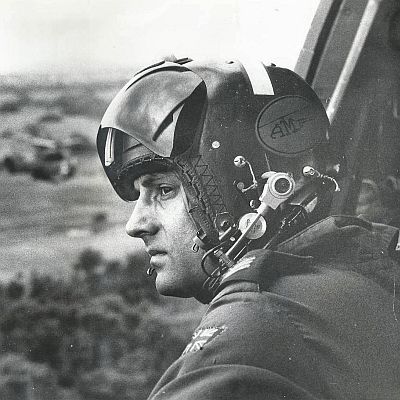- Joined
- Oct 11, 2010
- Messages
- 12,712
- Reaction score
- 7,467
- Age
- 61
Squadron Leader Brian Jopling, was aboard the container ship Atlantic Conveyor, which was carrying RAF helicopters and supplies, on May 25, 1982, when it was sunk by an Argentine missile, killing 12 sailors.

B. Jopling (born on 1951) is an air loadmaster employed since October 1981 as a crewman on No. 18 Squadron, Royal Air Force Odiham. On 25th May 1982 he was on board the Steam Ship Atlantic Conveyor in the South Atlantic during the Falkland War as part of the 18 Squadron deployment in support of Operation CORPORATE. During the late afternoon, the ship was attacked and hit by an argentine Exocet missile.
Jopling was manning an air defence machine gun position on the bridge during the attack. The missile started a fire on the ship which rapidly spread out of control and the decision was taken to abandon the stricken vessel.
B. Jopling was among the last to leave the bridge and, as he descended towards the main deck, he was enveloped by thick black smoke. He rapidly donned his respirator and led several people onwards in a human chain but, realising that it would be impossible for the others to survive without respirators, he had to retreat. He eventually found an alternative path within the ship and led his party of survivors to the main deck where they climbed over the side and entered the water prior to boarding a liferaft. The liferaft Jopling selected was one of the few remaining and was overcrowded; he, together with several others, was unable to board it.
The sea was very cold and night had fallen, adding to the difficulties. The liferaft was still attached to the ship and was being buffeted against the ship's side as the ship rolled. Realising the danger this represented to the liferaft and its occupants, Jopling made his way around the liferaft and, despite being struck several times by the ship, eventually managed to sever the lines holding the liferaft to the blazing hulk.
As the occupants of the liferaft became more organised, other survivors were gradually brought on board. Jopling appreciated that as he was wearing aircrew survival equipment, he was better placed than other survivors in the water. He therefore elected to remain in the sea, encouraging and helping men to hold onto the liferaft; only when he had ensured that there were no more survivors in the water, did he allow himself to be dragged, exhausted, aboard. He was in the water for between one and two hours in extremely hazardous conditions.
B. Jopling acted in the finest traditions of the Royal Air Force and his selfless conduct undoubtedly saved many lives.
He was awarded the prestigious Queen’s Gallantry Medal for his actions. Jopling died of renal cancer on March 20, 2014.

B. Jopling (born on 1951) is an air loadmaster employed since October 1981 as a crewman on No. 18 Squadron, Royal Air Force Odiham. On 25th May 1982 he was on board the Steam Ship Atlantic Conveyor in the South Atlantic during the Falkland War as part of the 18 Squadron deployment in support of Operation CORPORATE. During the late afternoon, the ship was attacked and hit by an argentine Exocet missile.
Jopling was manning an air defence machine gun position on the bridge during the attack. The missile started a fire on the ship which rapidly spread out of control and the decision was taken to abandon the stricken vessel.
B. Jopling was among the last to leave the bridge and, as he descended towards the main deck, he was enveloped by thick black smoke. He rapidly donned his respirator and led several people onwards in a human chain but, realising that it would be impossible for the others to survive without respirators, he had to retreat. He eventually found an alternative path within the ship and led his party of survivors to the main deck where they climbed over the side and entered the water prior to boarding a liferaft. The liferaft Jopling selected was one of the few remaining and was overcrowded; he, together with several others, was unable to board it.
The sea was very cold and night had fallen, adding to the difficulties. The liferaft was still attached to the ship and was being buffeted against the ship's side as the ship rolled. Realising the danger this represented to the liferaft and its occupants, Jopling made his way around the liferaft and, despite being struck several times by the ship, eventually managed to sever the lines holding the liferaft to the blazing hulk.
As the occupants of the liferaft became more organised, other survivors were gradually brought on board. Jopling appreciated that as he was wearing aircrew survival equipment, he was better placed than other survivors in the water. He therefore elected to remain in the sea, encouraging and helping men to hold onto the liferaft; only when he had ensured that there were no more survivors in the water, did he allow himself to be dragged, exhausted, aboard. He was in the water for between one and two hours in extremely hazardous conditions.
B. Jopling acted in the finest traditions of the Royal Air Force and his selfless conduct undoubtedly saved many lives.
He was awarded the prestigious Queen’s Gallantry Medal for his actions. Jopling died of renal cancer on March 20, 2014.






